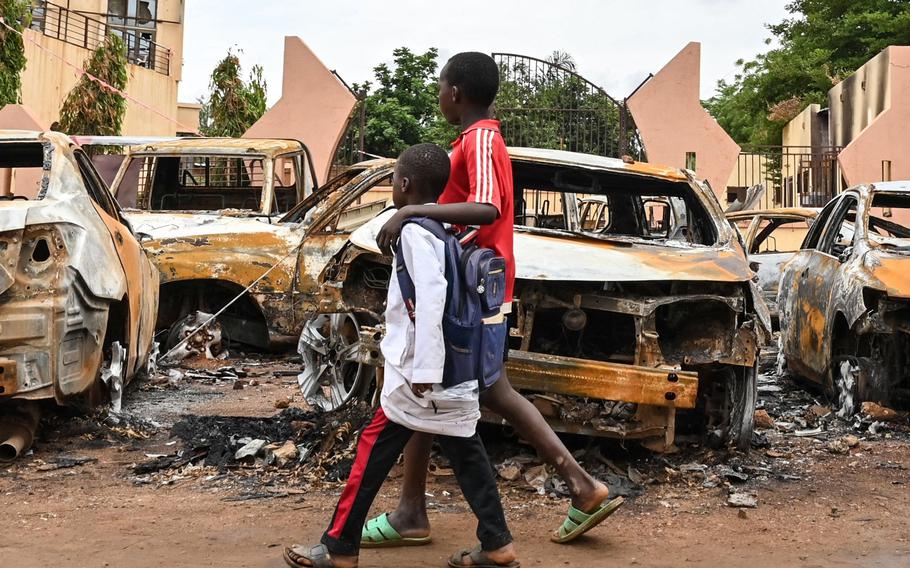
Children walk past burned cars outside the headquarters of president Bazoum’s Nigerien Party for Democracy and Socialism in Niamey on Monday, Aug. 7, 2023. Niger’s military rulers Monday were in defiance of an ultimatum to restore the elected government as the threat of possible military intervention was still on the table. (AFP via Getty Images/TNS)
(Tribune News Service) — Secretary of State Antony Blinken said the U.S. backs regional efforts to bring a diplomatic resolution to the “extremely troubling” situation in Niger, where a junta ignored demands to relinquish power and began announcing a new cabinet.
West African heads of state are due to meet in the Nigerian capital, Abuja, on Thursday to discuss the crisis in Niger, where soldiers seized control of the state and took President Mohamed Bazoum hostage on July 26. U.S. acting Deputy Secretary of State Victoria Nuland traveled to the capital, Niamey, on Monday for what she described as “difficult talks” with junta officials about reinstating Bazoum.
“We are supporting the efforts of ECOWAS in Africa to restore constitutional order in Niger,” Blinken said in an interview Tuesday with Radio France Internationale. “The interruption of this constitutional order puts us and many other countries in a position where we have to stop our aid, our support, and this will not benefit the people of Niger.”
Leaders of the Economic Community of West African States regional bloc gave Niger’s military leaders until Aug. 6 to hand back power to Bazoum or face the threat of military intervention. The junta restricted access to the country’s airspace Sunday, citing warnings of an attack from foreign powers.
The coup in Niger is the sixth in West Africa over the past three years. Ecowas didn’t threaten to use force to reverse any of the others, and Mali, Guinea and Burkina Faso are today under military rule, with their leaders dragging their feet to return power to civilians.
The bloc is likely to ultimately take a similar tack in Niger, Vladimir Antwi-Danzo, a security analyst and director of the Ghana Armed Forces Command and Staff College, said by phone from the capital, Accra.
“There’s the threat of a military intervention, but we don’t see any sign of troops preparing to deploy,” he said.
The 15-member bloc successfully intervened in Gambia in 2017 to help oust dictator Yahya Jammeh, who refused to step down after an electoral defeat. That time there was no violence — Senegalese troops advancing toward the capital, Banjul, were enough to make Jammeh change his mind.
But Niger is over 100-times the size of Gambia, and has close cultural and trade ties to neighboring Nigeria, which would have to lead any intervention given that it’s the region’s most influential country and has its biggest military. Senators and civil society groups from Nigeria’s north — which borders Niger — have already expressed their opposition to any intervention.
The junta has so far largely ignored the threat and moved to consolidate power. Niger’s self-declared military leader Abdourahamane Tiani on Monday appointed Ali Lamine Zeine as prime minister, according to a statement read on state broadcaster Tele Sahel. Tiani didn’t meet Nuland, the second-ranking US diplomat.
©2023 Bloomberg L.P.
Visit bloomberg.com.
Distributed by Tribune Content Agency, LLC.